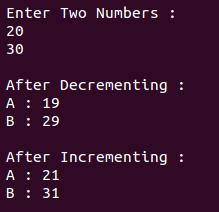Overloading Unary operator
Write a C++ program to overload unary operators that is increment and decrement.
Operator overloading is a type of polymorphism in which an operator is overloaded to give user defined meaning to it. It is used to perform operation on user-defined data type.
Following program is overloading unary operators: increment (++) and decrement (--).
Output:

Write a C++ program to overload unary operators that is increment and decrement.
Operator overloading is a type of polymorphism in which an operator is overloaded to give user defined meaning to it. It is used to perform operation on user-defined data type.
Following program is overloading unary operators: increment (++) and decrement (--).
#include<iostream>
using namespace std;
class IncreDecre
{
int a, b;
public:
void accept()
{
cout<<"\n Enter Two Numbers : \n";
cout<<" ";
cin>>a;
cout<<" ";
cin>>b;
}
void operator--() //Overload Unary Decrement
{
a--;
b--;
}
void operator++() //Overload Unary Increment
{
a++;
b++;
}
void display()
{
cout<<"\n A : "<<a;
cout<<"\n B : "<<b;
}
};
int main()
{
IncreDecre id;
id.accept();
--id;
cout<<"\n After Decrementing : ";
id.display();
++id;
++id;
cout<<"\n\n After Incrementing : ";
id.display();
return 0;
}
using namespace std;
class IncreDecre
{
int a, b;
public:
void accept()
{
cout<<"\n Enter Two Numbers : \n";
cout<<" ";
cin>>a;
cout<<" ";
cin>>b;
}
void operator--() //Overload Unary Decrement
{
a--;
b--;
}
void operator++() //Overload Unary Increment
{
a++;
b++;
}
void display()
{
cout<<"\n A : "<<a;
cout<<"\n B : "<<b;
}
};
int main()
{
IncreDecre id;
id.accept();
--id;
cout<<"\n After Decrementing : ";
id.display();
++id;
++id;
cout<<"\n\n After Incrementing : ";
id.display();
return 0;
}
Output:

The unary operators operate on a single operand and following are the examples of Unary operators −
- The increment (++) and decrement (--) operators.
- The unary minus (-) operator.
- The logical not (!) operator.
The unary operators operate on the object for which they were called and normally, this operator appears on the left side of the object, as in !obj, -obj, and ++obj but sometime they can be used as postfix as well like obj++ or obj--.
Following example explain how minus (-) operator can be overloaded for prefix as well as postfix usage.
Live Demo#include <iostream> using namespace std; class Distance { private: int feet; // 0 to infinite int inches; // 0 to 12 public: // required constructors Distance() { feet = 0; inches = 0; } Distance(int f, int i) { feet = f; inches = i; } // method to display distance void displayDistance() { cout << "F: " << feet << " I:" << inches <<endl; } // overloaded minus (-) operator Distance operator- () { feet = -feet; inches = -inches; return Distance(feet, inches); } }; int main() { Distance D1(11, 10), D2(-5, 11); -D1; // apply negation D1.displayDistance(); // display D1 -D2; // apply negation D2.displayDistance(); // display D2 return 0; }
When the above code is compiled and executed, it produces the following result −
F: -11 I:-10 F: 5 I:-11
Hope above example makes your concept clear and you can apply similar concept to overload Logical Not Operators (!).
Comments
Post a Comment